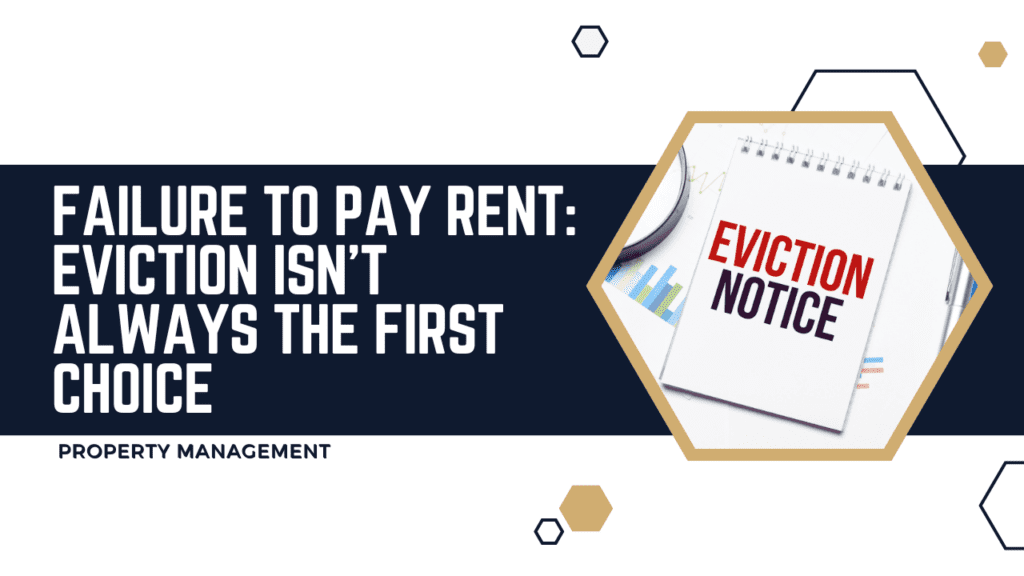
No one likes to think about eviction, especially not rental property owners.
We don’t love it as Northern Virginia property managers, either.
You don’t have to be an expert landlord to know that renting out your property comes with its fair share of challenges. Sometimes, you’ll find yourself searching extra hard for a good tenant. Sometimes, you’ll have to chase down late rent. Maybe you’ll find yourself facing property damage that exceeds the security deposit.
Risks abound, and one of the biggest challenges for rental property owners is eviction.
There are many reasons you might need to evict a tenant. Maybe they’ve violated the lease agreement and they refuse to come into compliance. Maybe you’ve discovered they’re running a meth lab out of the basement. Or, it could be something as simple as your tenants refusing to leave when the lease period has ended, even though they did not renew the lease agreement.
The most common reason for eviction, however, is nonpayment of rent.
The bad news? Eviction is expensive and time consuming.
The good news? Maybe you don’t have to evict at all.
There are other ways to manage a tenant who isn’t paying rent. We’re going to share some of the steps you can take before the courts and potentially the sheriff have to get involved.
Prioritize Tenant Communication Early and Often
The first thing you should do when a tenant fails to pay rent is to communicate with them.
Hopefully, you have a great relationship in place with your tenant already. When you have established trust and given them the idea that you’re a good listener, your tenant should feel safe coming to you if rent is going to be late one month. This advance notice allows you to plan accordingly.
If they have not reached out to you and rent does not come in when it should, give them a call or send them a message. It doesn’t have to be aggressive or demanding; simply remind them that rent was due and you have not received their payment yet. Ask when you can expect it.
You don’t want to assume that your tenant is deliberately avoiding payment. Sometimes, tenants face financial hardships or unexpected financial emergencies, making it difficult for them to keep up with rent payments on time. If this is a temporary situation that they can easily catch up with, they’ll be grateful that you reached out and willing to talk about what they can do now and in the future.
Reach out to your tenant to discuss the situation and ask if there’s anything you can do to help. Consider offering a payment plan or a payment schedule that they can afford. The goal is always to help them get caught up as soon as possible.
Offer a Grace Period in Your Lease Agreement
In Northern Virginia, landlords are not legally required to provide a grace period when it comes to rental payments. However, it’s a best practice that can give your tenants a bit more flexibility and ensure that rent does come in when it’s due.
Most grace periods are around five days. When you give tenants a five-day grace period to pay rent before assessing a late fee, they’ll work hard to get the rent paid before the end of that fifth day is reached.
A grace period is a good idea and perhaps extending that grace period for the first offense is also a good idea. You can give them a full week or five extra days to get the rent in without penalty. This will incentivize them to pay sooner rather than later. If they can avoid that late fee, they will.
Your tenants will also appreciate the gesture, and that will solidify a great relationship and make them more likely to stay in place and renew their lease agreement.
Partial Payment Options and Agreements
If your tenant can’t make the full rent payment, consider accepting partial payments. While it’s not ideal, for many landlords, it’s better than having no payment at all. It tells you that your tenants are still intending to pay the rest of the rent that’s due. If they were going to not pay at all and wait to be evicted, they would not offer the partial payment.
Have your tenant sign a written agreement outlining how much they’ll pay and when they’ll pay the outstanding balance. This way, there’s a clear understanding of the payment plan and expectations. You can hold them accountable to this agreement and if they fall short, you can take the steps necessary to evict.
Notices and Eviction Proceedings as a Last Resort
 When you have exhausted all other options or the tenant refuses to communicate with you, it may be time to take the necessary steps towards eviction. Sometimes, receiving a Pay or Quit Notice will motivate a tenant to catch up with the rent that’s due.
When you have exhausted all other options or the tenant refuses to communicate with you, it may be time to take the necessary steps towards eviction. Sometimes, receiving a Pay or Quit Notice will motivate a tenant to catch up with the rent that’s due.
A 5 Day Notice to Pay Rent or Quit will tell tenants they have five days to catch up or to move out. You will likely receive your payment within those five days, and if you don’t, it’s acceptable to move towards eviction. Even if it’s a last resort.
Eviction should only be done if all other options have failed. In Northern Virginia, landlords are required to go through a strict legal process to evict a tenant. Filing for eviction requires giving the tenant a written notice to quit, filing a complaint with the court, and attending a hearing. It’s a time-consuming and costly process that should only be done if all other alternatives have been exhausted.
The failure to pay rent can be a stressful situation for landlords, but it’s important to handle the situation correctly and professionally. Pay attention to your tenant screening process so you know you’re placing well-qualified renters with a history of on-time payments. This will help you prevent evictions with your own tenancies.
We can help you avoid evictions and move through them if they become necessary. If you have a tenant who is not paying rent, please contact us at Comfort Property Management. We lease, manage, and maintain investment properties throughout Northern Virginia, in Arlington, Alexandria, Fairfax, Falls Church, McLean, Ashburn, Sterling, Springfield, Reston, Chantilly, Manassas, Centreville, and Herndon.
